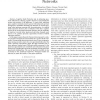Free Online Productivity Tools
i2Speak
i2Symbol
i2OCR
iTex2Img
iWeb2Print
iWeb2Shot
i2Type
iPdf2Split
iPdf2Merge
i2Bopomofo
i2Arabic
i2Style
i2Image
i2PDF
iLatex2Rtf
Sci2ools
GLOBECOM
2009
IEEE
2009
IEEE
On Spectrum Selection Games in Cognitive Radio Networks
Abstract—Cognitive Radio Networks aim at enhancing spectrum utilization by allowing cognitive devices to opportunistically access vast portions of the spectrum. To reach such ambitious goal, cognitive terminals must be geared with enhanced spectrum management capabilities including the detection of unused spectrum holes (spectrum sensing), the characterization of available bands (spectrum decision), the coordination with other cognitive devices in the access phase (spectrum sharing), and the capability to handover towards other spectrum holes when licensed users kick in or if a better spectrum opportunity becomes available (spectrum mobility). In this paper, a game theoretic framework is proposed to evaluate spectrum management functionalities in Cognitive Radio Networks. The spectrum selection process is cast as a non-cooperative game among secondary users who can opportunistically select the “best” spectrum opportunity, under the tight constraint not to harm primary licensed us...
| Added | 21 May 2010 |
| Updated | 21 May 2010 |
| Type | Conference |
| Year | 2009 |
| Where | GLOBECOM |
| Authors | Ilaria Malanchini, Matteo Cesana, Nicola Gatti |
Comments (0)

